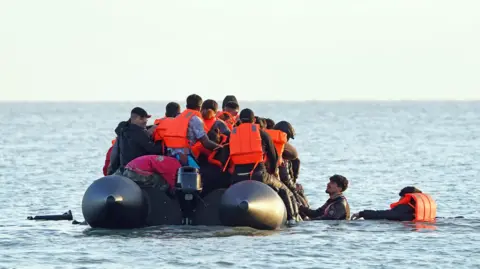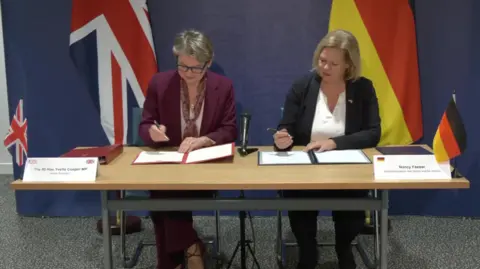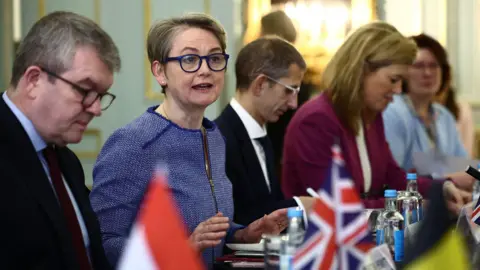Germany to tighten people-smuggling law in UK deal
 PA Media
PA MediaGermany will tighten its law to make it easier to prosecute those helping to smuggle migrants to the UK, as part of a new plan agreed between the two countries.
Facilitating people-smuggling is not technically illegal in Germany currently, if it is to a third country outside the EU - which, following Brexit, includes the UK.
Under the new agreement, the Home Office says Germany has pledged to make the activity a clear criminal offence.
Home Secretary Yvette Cooper said the "ground-breaking" agreement would help tackle the criminal gangs organising small boat crossings.
The Conservatives said the plan did not "go far enough" and would not provide the deterrent necessary to reduce crossings.
Earlier this year, a five-month long BBC investigation exposed the significant German connection to small boat crossings in the Channel, with people-smugglers operating in the west German city of Essen.
The new joint UK-German agreement comes as the Home Office's own Border Security Command warns that Channel crossings "are the most dangerous they have ever been".
Charlie Eastaugh, director of international operations at the command, told the BBC: "We've seen tyre inner tubes being used in place of life jackets, it's extraordinarily dangerous, they are death traps.
"There are fewer boats and fewer engines in supply, we have seized over 450 boats and engines across Europe - and organised crime gangs are taking greater risks.
"We're seeing increased numbers in these boats because of the disruptive work we have carried out with our law enforcement partners in Europe."
Miguel Berger, the German ambassador to the UK, said it was already effectively illegal to smuggle people towards the UK as they would have to go through an EU country like France or Belgium.
"If we also cooperate in the countries of transit and origin, I think we can jointly put a lot of pressure on these criminal networks," he told BBC Radio 4's Today programme on Tuesday.

More than 33,000 have crossed the English Channel by small boat this year, which is higher than the 29,000 last year, but below the record numbers in 2022.
More than 70 people have died trying to make the crossing this year this year, and the average number of people per boat has risen to 53 compared with 10 back in 2019.
After coming into power in July, the Labour government ditched the previous Conservative government's plan to deter crossings by sending to Rwanda those making the journey.
Instead Prime Minister Sir Keir Starmer said his government would focus on tackling the criminal gangs arranging the crossings.
As part of that approach, Home Secretary Yvette Cooper has signed an agreement with Germany's Interior Minister Nancy Faeser, committing to co-operation on tackling people smuggling.
The Joint Action Plan includes Germany's intention to make clear that activities facilitating migrant-smuggling to the UK will be deemed criminal offences.
It also commits both countries to "exchanging expertise with a special focus on removing migrant-smuggling content from social media platforms".
The UK government said: "Once enacted, this anticipated law change is expected to significantly increase the number of prosecutions made in relation to migrant smuggling."
In October, the BBC uncovered the activities of small boat smugglers based in Germany, including how they used multiple secret warehouses to evade the German police.
At the time, one UK Home Office source told the BBC there was "frustration" about Germany's legal framework, which did not technically consider the arranging of people smuggling to countries outside of the EU to be illegal.
Speaking on Monday, Cooper said the partnership would help the UK go after the gangs who had been "getting away with it for too long".
Faeser said it would "help us end the inhumane activities of criminal migrant smuggling organisations".
"Many of these crimes are planned in Germany. Together, we are now countering this unscrupulous business with even more resolve."
Responding to the announcement, Conservative shadow home secretary Chris Philp said: "The British public deserves a serious plan to control our borders and stop criminal gangs.
"The National Crime Agency has said a deterrent is necessary to reduce the number of crossings, yet Labour scrapped the only deterrent before it even got started.
"Meanwhile the numbers of illegal immigrants coming here continue to climb, with an 18% increase compared to the same period last year, with more than 20,000 people having made the crossing since the election."
 PA Media
PA MediaThe plan was signed ahead of a meeting of the Calais Group in London on Tuesday, a grouping of northern European countries focused on tackling illegal migration.
Cooper was joined by ministers and police from Germany, as well as from France, Belgium and the Netherlands, to discuss migration in Europe.
Sir Keir has said he wants to reduce both regular and irregular migration but has avoided setting a target for cutting numbers, arguing that an "arbitrary" cap would not work.
Privately, Labour ministers acknowledged that tackling irregular migration would be key to how they are judged by voters.

Sign up for our Politics Essential newsletter to read top political analysis, gain insight from across the UK and stay up to speed with the big moments. It'll be delivered straight to your inbox every weekday.
